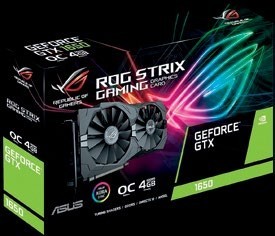ASUS ROG Strix GeForce GTX 1650 Gaming OC.


The ASUS ROG Strix GeForce GTX 1650 Gaming OC is a dual-fan model that boasts ASUS’ DirectCU II cooler and IP5X dust resistance. It’s a little on the beefy side for a card with a TDP of just 75W, which is both a good and bad thing. The additional features drive up the price of the card, and while the more robust feature set is certainly nice, the fact remains that it can sometimes push the price of the card outside the budget of its intended audience.
That said, the ROG Strix GeForce GTX 1650 Gaming OC offers much of what ASUS’ other ROG Strix cards do. This includes semipassive fans that will stop spinning when the GPU temperature falls below 55°C, Aura Sync RGB lighting, and a single FanConnect II 4-pin header. There’s a metal backplate as well, which helps protect the PCB and conveys a more premium feel to the card.
The power delivery subsystem comprises of a 4+1-phase design and solid polymer capacitors and alloy chokes that ASUS says will last longer and won’t produce annoying buzzing noises. In addition, the card is manufactured using the company’s Auto-Extreme Technology, which basically relies on automation for better reliability and consistency.
However, while NVIDIA’s reference design technically doesn’t require an external power connector, ASUS has included a single 6-pin PCIe connector anyway.
The TU116 GPU that the GeForce GTX 1650 uses is a smaller variant of the TU117 chip in the GeForce GTX 1660 and 1660 Ti. And while it features most of the benefits of the Turing architecture, it’s missing the new NVENC video encoder that the other Turing cards have. Instead, NVIDIA has slipped in the older Volta NVENC encoder, which means you don’t get the 15 per cent boost in efficiency and new features to avoid artifacting.
Given its target audience, I can’t really call it a bad card, even if it really looks lackluster compared to the other Turing cards. For instance, it manages just 54.6 fps in Deus Ex: Mankind Divided at High settings. NVIDIA wants to create a card for everyone, and eventually it’s going to reach a point where it’s simply impossible to be wowed by the performance numbers anymore. The GeForce GTX 1650 feels like it’s at that point, and it’s really the card you look to when you’re on a shoestring budget. Having said that, if you can wait, you’ll be much better served if you save up and get the GeForce GTX 1660 or 1660 Ti.
But specifically for this ASUS card, the budget GPU is paired with a bunch of premium features that no one really needs, like the FanConnect II header (do you really need an extra fan header in a system with a 75W card?), dual-fan cooler, and metal backplate. Ultimately, that’s driven its price up to a point where it’s no longer justified by the performance you’ll get.



PICTURES ASUS























